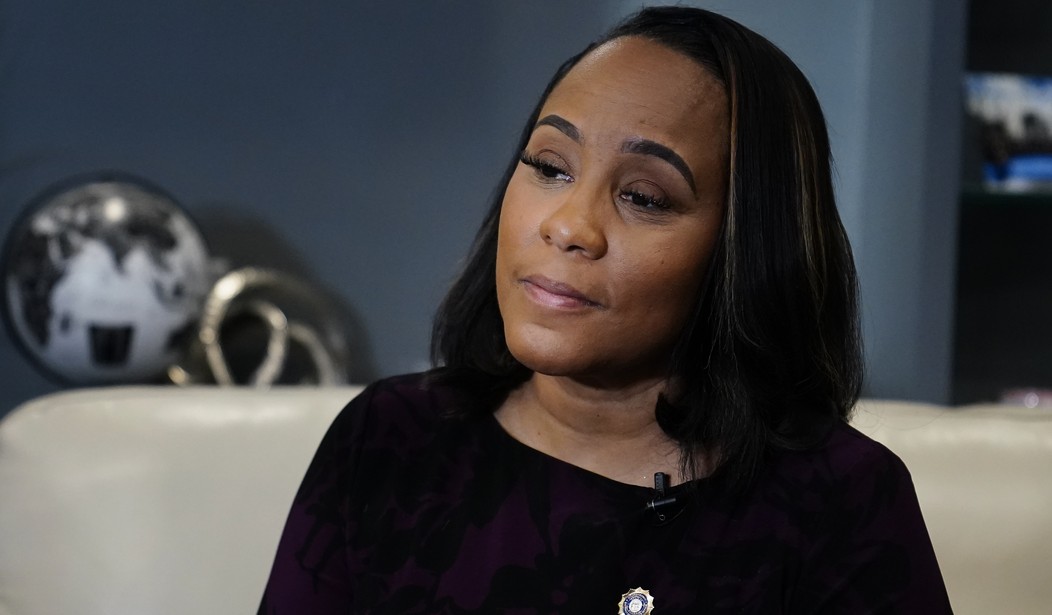At an Atlanta-area awards ceremony celebrating "extraordinary women" in the community, Fani Willis said she's going to "talk about race anyway" after the judge who oversaw the DA's disqualification proceedings scolded her for playing the race card.
"Recently, they tell me they don't like me to talk about race. Well, I'm going to talk about it anyway," Willis remarked.
"Truth is: There's some challenges that come with being black. And I see so much greatness in this city that has so many great African American leaders. And I appreciate all of the sacrifice that you all have had to make to be in these positions," Willis said at the South Fulton Women of the Shield Awards. The March 29 event—hosted by the city's police department—was held to shine a spotlight on "extraordinary women who have made remarkable contributions to law enforcement and community impact."
Willis thanked the police chief for "having the intelligence" to establish such an event "where we recognize that you've had to go through a little more to serve." She prefaced the speech: "It's hard out here always having to prove yourself two and three times."
NEW: Fani Willis doubles down, says she's been told not to talk about race, but she has to keep talking about it because there are challenges that come with being black, black people have to prove themselves two or three times. WATCH pic.twitter.com/6nXcDTL6tE
— Simon Ateba (@simonateba) March 31, 2024
The Fulton County district attorney's remarks defy Judge Scott McAfee's warning against making extrajudicial comments that could compromise former President Donald Trump's Georgia election interference case, which Willis is in charge of prosecuting.
Recommended
When the efforts to disqualify her were launched, Willis spoke from the pulpit at Atlanta's Big Bethel AME ("African Methodist Episcopal") Church, a black congregation, over MLK weekend. There, she claimed then-special prosecutor Nathan Wade, whom she hired to helm the prosecution and had an undisclosed affair with, was being singled out simply because he's "a black man."
In his March 15 ruling allowing Willis to remain on the Trump case (with some stipulations), McAfee determined that the chief Atlanta prosector's racially charged rhetoric was "legally improper," but not grounds for removal or dismissal of the indictment.
"The effect of this speech was to cast racial aspersions..." McAfee said of Willis's out-of-court commentary. However, case law, as he cited, says that while a prosecutor's comments may be improper, they must be "egregious[ly]" so to justify disqualification.
McAfee indicated that a gag order may be warranted in the foreseeable future. "The time may well have arrived for an order preventing the State from mentioning the case in any public forum to prevent prejudicial pretrial publicity..." the judge suggested.
"Providing this type of public comment creates dangerous waters for the District Attorney to wade further into," McAfee warned.
During closing arguments, Trump's defense attorney Steve Sadow accused Willis of tainting the jury pool ahead of trial and attempting to establish "prejudice" in the minds of the jurors. "Can you think of anything more that would heighten public condemnation of the defendant...?" Sadow questioned. "Virtually everybody in this community [...] has reviewed and analyzed that speech that she made in a premeditated way," added attorney Craig Gillen, who's representing another Trump co-defendant.
The judge noted that Willis's church speech did not "specifically mention any Defendant by name" and she used the plural "they" pronoun to ambiguously refer to her political opponents. "The State argues the speech was not aimed at any of the Defendants in this case. Maybe so. But maybe not," McAfee wrote. "Therein lies the danger of public comment by a prosecuting attorney."
Regardless, the Trump case is "too far removed from jury selection" for the jury pool to be permanently tainted, McAfee ruled. The court "cannot find that this speech [the church remarks] crossed the line to the point where the Defendants have been denied the opportunity for a fundamentally fair trial, or that it requires the District Attorney's disqualification," the judge concluded.
The defense sought to disqualify Willis on the basis of "forensic misconduct," also known as "improper comment." Now, they're taking the matter to the Georgia Court of Appeals after McAfee gave the greenlight to seek pre-trial appellate review of his ruling.
There is a lack of legal precedent for the disqualification standard based on forensic misconduct. McAfee mentioned that the court has not seen "a single additional case exploring the relevant standard for forensic misconduct, or an opinion that actually resulted in disqualification under Georgia law. Left unexplored, therefore, is how other examples of forensic misconduct can manifest, such as whether statements that stop short of commenting on the guilt of a defendant can be disqualifying."
Following the judge's non-disqualification decision, Willis publicly blabbed again about the Trump case despite McAfee recommending she should refrain from doing so. "The train is coming" for Trump and his 14 co-defendants, Willis told CNN.

























Join the conversation as a VIP Member